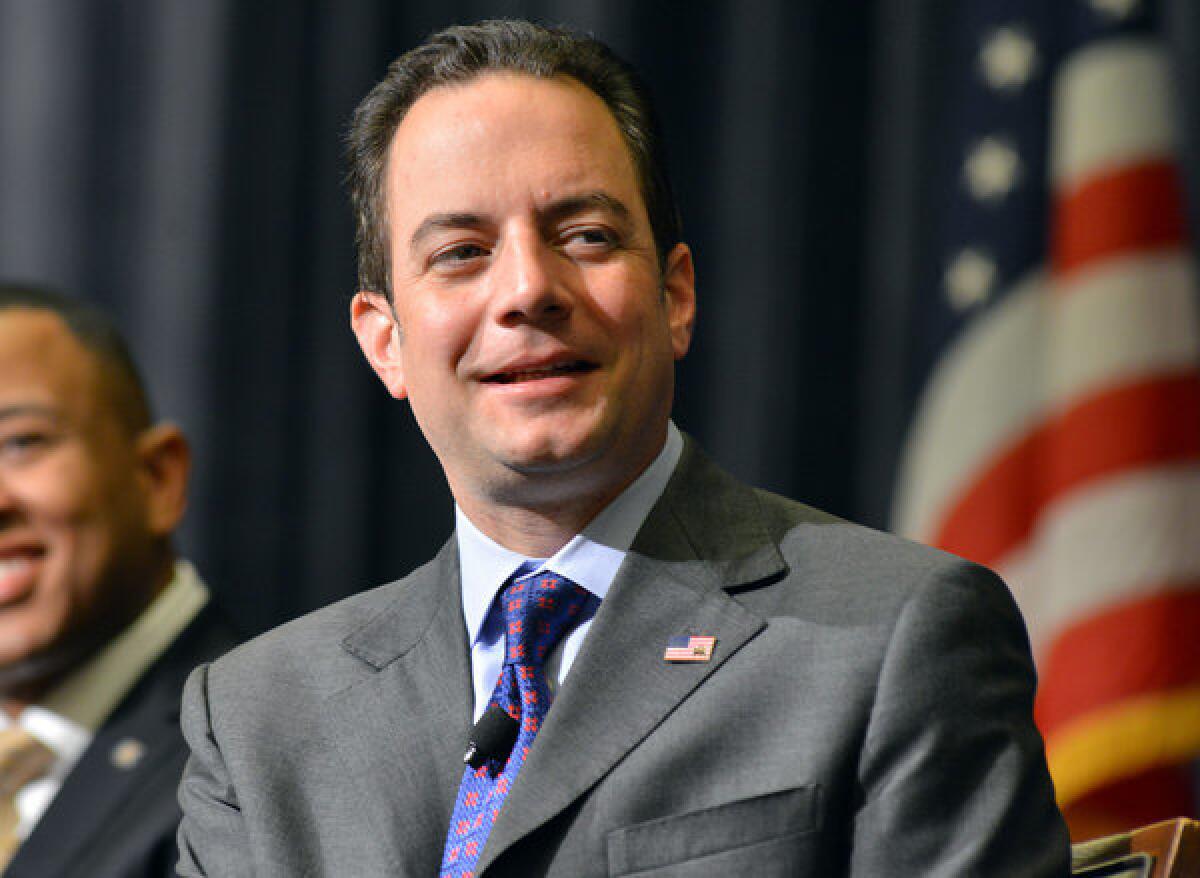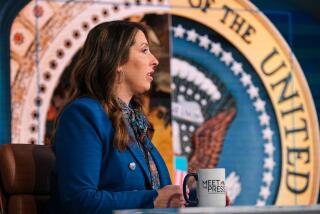How the RNC’s boycott of NBC and CNN could improve the debates

Republican National Committee Chairman Reince Priebus.
The preemptive strike that the Republican National Committee launched Friday against NBC and CNN seems pointless in many ways, even if you accept the premise of the GOP’s argument -- namely, that the documentaries the networks are developing about Hillary Rodham Clinton will help the former first lady and secretary of State in her expected campaign for the White House in 2016.
But I still like what the RNC is doing, albeit probably for different reasons than the ones that are motivating GOP honcho Reince Priebus.
I say “pointless” because, despite my colleague Michael McGough’s concerns about prior restraint, I don’t see either network backing away from the project simply because it might not be able to air some of the Republican debates. The ratings for those telecasts were fair to middling, especially in the early going; just by way of comparison, the season premiere of “Duck Dynasty” on cable this week drew twice as many viewers as the typical GOP debate in 2011.
The networks wouldn’t be investing in films about Clinton if they didn’t see the potential for big ratings. And unlike debates, which don’t live on in reruns, a film about a public figure as popular (and polarizing) as Clinton can be monetized in multiple ways after its initial broadcast. In fact, CNN plans to air its Clinton movie in theaters before putting it on cable.
It’s conceivable that the GOP’s stance could drive off advertisers, many of whom shy away from programming with a partisan bent. Then again, NBC didn’t seem to have any trouble selling ads for “The West Wing,” whose episodes often struck me as lengthy paeans to liberalism.
Anyway, the protest does at least two things that should help the GOP as it tries to retake the White House in 2016, with or without Clinton as the Democratic nominee.
First, the party’s assertion that the films will be ill-disguised hagiography invites the filmmakers and their producers to demonstrate their independence by portraying at least a few episodes from Clinton’s life that she’d just as soon not remind voters about. (This Wall Street Journal editorial from 2000 helpfully provides a number of examples.) Thus, the films that the RNC supposedly wants to block will ultimately provide more fodder for the 30-second ads that drive up Clinton’s “negatives.”
Second, and more important, it gives the GOP a rationale for some badly needed changes in its approach to presidential primary debates.
I watched almost all of them, and the one that was most illuminating to me was the one that CNBC held in Detroit. The questions asked by CNBC’s journalists and opinionators were notably better than the ones asked by moderators at the other debates, mainly because the former had expertise in a topic other than politics or the story of the day. That suggests we’d all be better served if the debates moved off general news networks such as CNN and onto more specialized channels.
But having better questions only takes you so far; one reason so many debates were lackluster was because the candidates stuck with scripted answers. True moments of spontaneity and thinking on one’s feet were few and far between, perhaps because when they happened, they tended to be damaging (e.g., Texas Gov. Rick Perry blanking out on which federal departments he wanted to eliminate; former Massachusetts Gov. Mitt Romney challenging Perry to a $10,000 bet).
To that end, the RNC should consider holding some of its debates in a format that breaks out of the adversarial-journalist mold. Ideally, the new format would drop the rat-a-tat rhythms and 60-second clocks of the typical debate in favor of a conversational tone and moderators who are more curious than challenging. In fact, it might help to have moderators who aren’t news people at all. For my money, some of the best questions asked in the 2008 and 2012 primaries came from YouTube users.
Another reason to look outside the world of journalism for moderators is to make it harder for candidates to blatantly evade the questions. It’s one thing for candidates to dance around a tough question from a reporter. It’s something else entirely when they don’t give a straight answer to someone whom viewers can identify with.
Granted, candidates have become so good at sticking to their scripts, it may not matter how the questions are posed or who asks them. And the primary debates may just be a sideshow, considering that the ultimate test these days appears to be how big a war chest a candidate can amass. Every time a good debate performance propelled a new Republican to the forefront of the campaign in 2011 or 2012, Romney ground that candidate down with a blitz of negative commercials. Just as Newt Gingrich or Rick Santorum.
ALSO:
The view from above Los Angeles
Will MTA’s Metro ever make it to LAX?
Jesse Lee Peterson, tea’d off in South L.A.
Follow Jon Healey on Twitter @jcahealey and Google+
More to Read
A cure for the common opinion
Get thought-provoking perspectives with our weekly newsletter.
You may occasionally receive promotional content from the Los Angeles Times.







